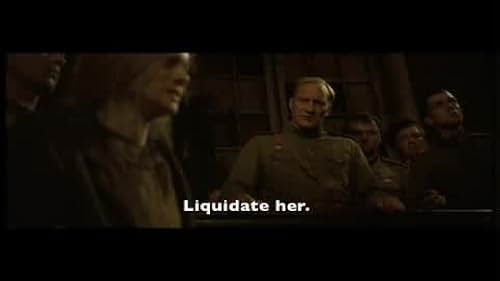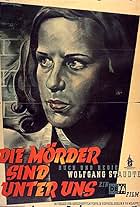CALIFICACIÓN DE IMDb
7.0/10
7.3 k
TU CALIFICACIÓN
Una mujer intenta sobrevivir a la invasión de Berlín por las tropas soviéticas durante los últimos días de la Segunda Guerra Mundial.Una mujer intenta sobrevivir a la invasión de Berlín por las tropas soviéticas durante los últimos días de la Segunda Guerra Mundial.Una mujer intenta sobrevivir a la invasión de Berlín por las tropas soviéticas durante los últimos días de la Segunda Guerra Mundial.
- Dirección
- Guionistas
- Elenco
- Premios
- 1 premio ganado y 4 nominaciones en total
Evgeniy Sidikhin
- Major Andreij Rybkin
- (as Evgeny Sidikhin)
Viktor Zhalsanov
- asiatischer Rotarmist
- (as Victor Zhalsanov)
- Dirección
- Guionistas
- Todo el elenco y el equipo
- Producción, taquilla y más en IMDbPro
Opiniones destacadas
rape is the particular plight of women during war and acknowledged at long last as a war crime.The plight of German women at the end of WW II was especially awful as they had protection from no one. General Eisenhower who punished rape committed by his men with execution outside of Germany (first rape took place six hours after invasion of Normandy had begun)but as for German women all men had free hands as these women were all declared "willing". The Americans are the only ones to have gone through archives as for army rape in WW II however the one recent book existing is not allowed for publishing in the US because of the war in Iraq (!!)so exists in French version only. The French and the British have preferred to turn a blind eye to what was done by their soldiers towards German women let alone the Russians. It is very important that this film has been made at long last. Subject concerns all not just its victims let alone the children born out of the horrors. Bravo Germany.
10hasosch
Max Färberböck, known to the world-wide audience since his "Aimee and Jaguar", shows in this newer film for once not the standard story of the bad Germans, who, deserving after what they have done, being Nazis, are liberated by the good Russians, the good Americans and the good Allies. It shows exactly the same experience that we all, who grew up in the East Block, had about our Russiand "friends". They came to rape, to destroy, to violate, to erase. It is a very interesting fact concerning mass psychology or perhaps better mass-psychosis that nobody normally speaks about the enormous amount of destruction done or caused by the liberators of end-World War II Europe. And nobody even mentions the Stalinist concentration camps. This is why we need films like "Eine Frau In Berlin".
However, in Färberböcks film, we see the Russians, "like animals, like pigs, an-alphabets, without culture" - as the Russian Major says it in his own words, he, who speaks, according to the main female character "a seldomly high-style Russian". Well, a little bit of "justness" had to be - not ALL Russians are like the "scum" (quotation from the movie) that we see. Interestingly, my Hungarian home-town had been bombed by Americans, but afterward the Russians came like vultures and pitched themselves into the ruins, what was female, was raped, what had been church or synagogue - was emptied and the treasures stolen, a subculture sneaking from the sou-terrain up to the ruins and even profiting from corpses and debris.
However, in Färberböcks film, we see the Russians, "like animals, like pigs, an-alphabets, without culture" - as the Russian Major says it in his own words, he, who speaks, according to the main female character "a seldomly high-style Russian". Well, a little bit of "justness" had to be - not ALL Russians are like the "scum" (quotation from the movie) that we see. Interestingly, my Hungarian home-town had been bombed by Americans, but afterward the Russians came like vultures and pitched themselves into the ruins, what was female, was raped, what had been church or synagogue - was emptied and the treasures stolen, a subculture sneaking from the sou-terrain up to the ruins and even profiting from corpses and debris.
ANONYMA - EINE FRAU IN BERLIN (A Woman In Berlin) is the painfully sensitive title of this exquisite film from writer/director Max Färberböck based on a once occult book by 'Anonyma' that has become a recent bestseller in Germany. It has the courage to tell the story of what it was like in Berlin as World War II was ending - the time of the Russian siege of the city just before and just after Hitler committed suicide, ending the horror of the Nazi regime. While many films have been made about the German populace and how they coped with the fall of their 'great Third Reich' country that was to rule the planet, few have been able to allow the audience to understand the brutalities of war on the people of Germany in so direct a fashion. It is a film that will haunt the viewer for a long time, a film that will restore some dignity to the German people who lived through it, not being part of Hitler's madness but being trapped in the ugliness that followed his fall.
Anonyma (Nina Hoss) is a journalist, a pretty woman living in the cellars and other hiding places while the Russians took over Berlin. She helps her fellow survivors of the bombing of Berlin, struggling for food and protection. The Russian soldiers, still angry with the gnawing hatred for the Germans from the Siege of Leningrad and the loathing of anything that exists in Hitler's Berlin, drink heavily and seek out the women from hiding to satisfy their insatiable lust. 'Berlin is a German whorehouse' and all women, from children to youngsters to elderly fraus are continually raped and beaten as part of the victors' rage. Anonyma speaks several languages including Russian and decides her only hope for survival is to align with the Commander of the troops, Major Andreij Rybkin (Yevgeni Sidikhin), believing that if she becomes his concubine she will be safe from the random raping by the rest of the soldiers. Their liaisons become more than outlets for the Major and the two gradually bond despite the horrors outside their rendezvous. They survive. Hitler commits suicide and the war is over and the two face the reality of returning to their previous pre-war lives...or can they?
Nina Hoss is brilliant in this difficult role and though the script allows her little to say, she conveys so much through her expressions that words are nearly unnecessary. Likewise, Yevgeni Sidikhin captures the dichotomy of emotional response his character must display, finding just the right balance between the conquering Russian soldier and the compassionate and vulnerable lover. The cinematography by Benedict Neuenfels captures the devastation not only of the buildings but also of the emotions of both sides of the participating groups and Zbigniew Preisner is responsible for the musical score that adds immeasurably to the drama. This is one of the great German films that took many years of maturing to make. It should be seen.
Grady Harp
Anonyma (Nina Hoss) is a journalist, a pretty woman living in the cellars and other hiding places while the Russians took over Berlin. She helps her fellow survivors of the bombing of Berlin, struggling for food and protection. The Russian soldiers, still angry with the gnawing hatred for the Germans from the Siege of Leningrad and the loathing of anything that exists in Hitler's Berlin, drink heavily and seek out the women from hiding to satisfy their insatiable lust. 'Berlin is a German whorehouse' and all women, from children to youngsters to elderly fraus are continually raped and beaten as part of the victors' rage. Anonyma speaks several languages including Russian and decides her only hope for survival is to align with the Commander of the troops, Major Andreij Rybkin (Yevgeni Sidikhin), believing that if she becomes his concubine she will be safe from the random raping by the rest of the soldiers. Their liaisons become more than outlets for the Major and the two gradually bond despite the horrors outside their rendezvous. They survive. Hitler commits suicide and the war is over and the two face the reality of returning to their previous pre-war lives...or can they?
Nina Hoss is brilliant in this difficult role and though the script allows her little to say, she conveys so much through her expressions that words are nearly unnecessary. Likewise, Yevgeni Sidikhin captures the dichotomy of emotional response his character must display, finding just the right balance between the conquering Russian soldier and the compassionate and vulnerable lover. The cinematography by Benedict Neuenfels captures the devastation not only of the buildings but also of the emotions of both sides of the participating groups and Zbigniew Preisner is responsible for the musical score that adds immeasurably to the drama. This is one of the great German films that took many years of maturing to make. It should be seen.
Grady Harp
Although I was aware of the awesomeness of German cinema in the past decades, I was still pleasantly surprised by this film. The title of the movie implies a specific point of view - the plight of a woman trapped in Berlin during the last days of WW2. The movie is however far less black-and-white (metaphorically speaking, of course) than it could have been. It goes beyond a simplistic right/wrong attitude and instead puts the audience in a position to ponder how in a war atrocities escalate and feed on themselves in a typical "chicken and egg" problem. Even the fact that the book on which the movie is based was met with outrage when it was first published in the 50's is ultimately part of this chain.
There are more complex answers to why horrible things happen in a war, and in the world in general - and Europe has had its share of it - and this film manages to capture these complexities masterfully.
There are more complex answers to why horrible things happen in a war, and in the world in general - and Europe has had its share of it - and this film manages to capture these complexities masterfully.
War is not a pleasant experience. Those who follow the news know that there have been several of our own soldiers accused and prosecuted for rape and murder in Iraq. In all wars there are local citizens who prostitute themselves to feed their family. It is often hard to make a choice between honor and survival.
This is the story of German women at the end of WWII when the Russians have moved into Germany. They are, of course, raped and abused, as women often are by invading armies. The question then becomes, how best to survive. Anonyma (Nina Hoss) decides the best way is to find the best Russian officer to care for her in exchange for sex.
It is easy to see why the Germans and the Russians hated the book, upon which this film is based, when it came out after the war. They are not shown in a good light. That is no surprise. Soldiers usually do not come from Ivy League universities, but from farms and shops.
Nina Hoss is one of the very few women that can look splendid even in rags.
Oustanding film.
This is the story of German women at the end of WWII when the Russians have moved into Germany. They are, of course, raped and abused, as women often are by invading armies. The question then becomes, how best to survive. Anonyma (Nina Hoss) decides the best way is to find the best Russian officer to care for her in exchange for sex.
It is easy to see why the Germans and the Russians hated the book, upon which this film is based, when it came out after the war. They are not shown in a good light. That is no surprise. Soldiers usually do not come from Ivy League universities, but from farms and shops.
Nina Hoss is one of the very few women that can look splendid even in rags.
Oustanding film.
¿Sabías que…?
- TriviaThe movie's source novel is the diary of an unnamed woman, called Anonyma, from April 29, 1945 to June 22, 1945.
- ErroresWhen Germany's surrender is announced, the Soviet troops start singing the "Alexandrov version" of their national anthem, adopted about a year earlier. That version had no lyrics until Stalin intervened, and the heavy fighting wouldn't have allowed the soldiers to learn them. They most likely sang the chorus of "The Internationale," an earlier, better-known version.
- ConexionesFeatured in History: Anonyma - Die Frauen von Berlin (2010)
Selecciones populares
Inicia sesión para calificar y agrega a la lista de videos para obtener recomendaciones personalizadas
- How long is A Woman in Berlin?Con tecnología de Alexa
Detalles
- Fecha de lanzamiento
- Países de origen
- Sitio oficial
- Idiomas
- También se conoce como
- Anónima - Una mujer en Berlín
- Locaciones de filmación
- Productoras
- Ver más créditos de la compañía en IMDbPro
Taquilla
- Total en EE. UU. y Canadá
- USD 294,014
- Fin de semana de estreno en EE. UU. y Canadá
- USD 12,439
- 19 jul 2009
- Total a nivel mundial
- USD 1,863,939
- Tiempo de ejecución
- 2h 11min(131 min)
- Color
- Mezcla de sonido
- Relación de aspecto
- 2.35 : 1
Contribuir a esta página
Sugiere una edición o agrega el contenido que falta



































